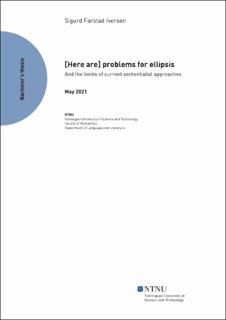[Here are] problems for ellipsis
Abstract
Denne bacheloroppgåva omhandlar frasar ("nonsententials") som 'Freedom for Navalny' og 'A coffee for me(please)', og påstanden at slike utsagn inneheld meir syntaktisk materiale enn kva som kan sjåast på overflata. Påstanden om at desse 'ufullstendige' strukturane eigentleg er 'heile' setningar på eit eller anna underliggande nivå har motivert mange verk som har argumentert for ymse måtar å rekonstruere det manglande materialet. Blant dei mest omfattande framgongsmåtane, argumenterer Merchant (2004, 2010) for ei handfull metodar, ved f.eks., å basere seg på dei morfologiske prega ved frasane, den kontekstuelle 'typiskskapen', eller ved å føreslå eksistense av eit set med konstant tilgjengelege syntaktiske element. Progovac (2006), på den andre sida, omdefinerer setninga og argumenterer for at desse frasane berre er mindre leddsetningar ("small clauses") utan tidsbøying ("Tense"), medan for frasar som kan brukast utan noko lingvistisk materialet i forkant, føreslår Weir (2020) at det finnast ei lita mengde syntaktisk struktur, ein null-preposisjon, for å reiegjere for problem i tidlegare framgongsmåtar. Oppgåva vurderer kor mykje som kan forklarast ved hjelp av kvar av framgongsmåtane, og veg desse opp mot kva som kan føresjåast derifrå. Gjennom heile oppgåva argumenterast det for at under dei noverande framgongsmåtane, kan verken mange slike frasar, eller kasustrekke dei har, forklarast, og at difor ikkje påstanden om underliggande struktur er rettferdigjort. This bachelor’s thesis considers nonsententials like 'Freedom for Navalny' and 'A coffee for me(please)', and the position that such nonsententials contain more syntactic material than what isimmediately perceivable. The claim that these ‘incomplete’ structures really are ‘full’ sentencesat some subsentential level have motivated many works arguing for varies ways of reconstructingthe missing material. Among the most elaborate approaches, Merchant (2004, 2010) argues for ahandful of methods, e.g., drawing from the morphological features of nonsententials, theircontextual ‘rifeness’, and proposing a set of constantly available syntactic items accessible at anytime. Progovac (2006), on the hand, redefines the sentence arguing that nonsententials are simplysmall clauses without Tense, while for discourse-initial nonsententials, Weir (2020) proposes asmall amount of syntactic structure, a null P, to account for problems of previous approaches. Thethesis evaluates the explanatory scope of each of these approaches, and weighs them against theirpredictions. Overall, it is argued that, currently, under sententialist approaches, features such ascase behave unpredictably, while many nonsententials cannot be accounted for, and thattherefore, the sententialist position remains unwarranted.
